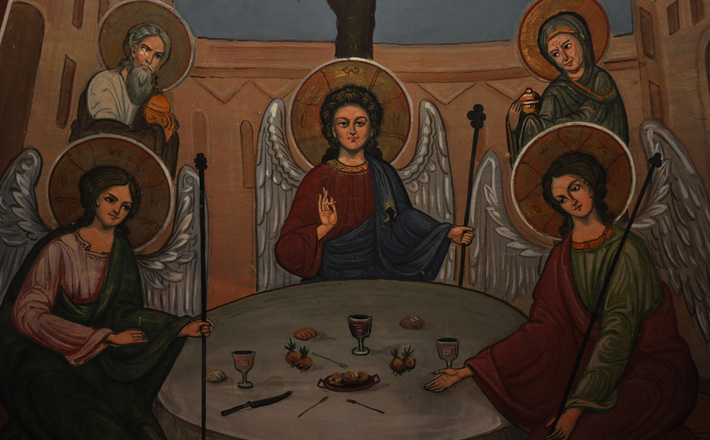Commentary on John 3:1-17
From the Apostles’ Creed:
“I believe in God, the Father almighty,
I believe in Jesus Christ, God’s only Son, our Lord,
I believe in the Holy Spirit.”
These are the words many of us recite together each time we gather for worship. In them we affirm our belief in the Holy Trinity. Even as we say these words together, we understand so little of what we are repeating. That is the mystery of the doctrine that we hold so centrally in our faith.
This is a pregnant passage — both literally and figuratively. There is too much here to preach in one sermon so it will be important to settle on something and then to go with that focal point.
This passage contains, perhaps, the best known verse in the entire Bible. John 3:16 can be a sermon in itself. However, the context for the sermon is Trinity Sunday. I will attempt in the next paragraphs to open up some parts of the text so that you may tease out something as a focal point. All of this will not hang together. Perhaps something will spark an idea that you can run with.
Perhaps there is no story in the gospels that spells out the conundrum of belief as does the account of Nicodemus. The conversation itself and the monologue that follows are incomprehensible at best. Words may mean one thing. Then the words may mean something entirely different. This is the gospel writer at his best.
There are two identified teachers in the passage.
- Verse 2: Nicodemus names Jesus as “Rabbi … a teacher who has come from God.”
- Verse 10: Jesus questions Nicodemus “Are you the teacher of Israel?” (Note translation in NRSV as “a teacher” which is an incorrect reading of Greek.)
The reality is that only one of the teachers has accurate understanding — the teacher who has come from God. Jesus is clearly the teacher with the spiritual quality because Jesus comes from God. Nicodemus comes in the night and belongs to the darkness.
This sets up a dichotomy that is clear throughout the Gospel of John, those who understand and those who do not. It is the Spirit who creates the capacity to comprehend. This is the conundrum. Those who have the Spirit (born again from above) can apprehend fully. Those who do not have the Spirit cannot. Nicodemus may want to understand but without being born again from above (heavenly, spiritual realm), Nicodemus cannot possibly understand. Nicodemus is doomed to misunderstanding.
Nicodemus’ question in verse 11: “How can these things be?” is the exact question of the day. And it is the question that can never be answered. A theological treatise for a Trinity Sunday sermon will not suffice. Neither will a sermon full of analogies like the core, the meat, and the peel of an apple. The Trinity cannot be analogized.
The text itself is disjointed and illustrates the danger of preaching it as a whole.
- Verses 1-10 are a conversation (of sorts) between Jesus and Nicodemus. However, they are not actually having the same conversation. They are talking across each other. Jesus is using slippery words that have double meanings to him and only singular ones to Nicodemus. Anothen means “again” and “from above.” It has a spiritual and a time reference. Nicodemus can only comprehend the time (“second time” of v. 4).
Because they were having a conversation but not using the same language, so to speak, effective communication did not happen.
- Verses 11-17 move into a monologue in which Jesus no longer addresses Nicodemus. It is as if Jesus has given up completely on the incredulousness of the teacher of Israel. In fact with verse 11, Jesus abruptly brushes aside Nicodemus and others of his kind (“you — plural — do not receive our testimony”).
It is in the monologue where Jesus explicates some sense of the Trinity within the idea of his own role in salvation. Jesus descends from heaven. God gave the Son. God sent the Son. The Son of Man must be lifted up. All this is for the sake of salvation.
The monologue reveals the purpose of Jesus’ coming to earth but does so in veiled language. The ones who can understand the monologue are those who have been born again from heaven through the Spirit and the water. Understanding of Jesus (and the Trinity) comes only as gift. Just as God gave the Son out of love for the world, so the Spirit will reveal (initiate belief) and thus initiate one into the Kingdom of God (v. 5).
So, on this Trinity Sunday does it matter that we cannot fully explicate the theology of the trinity or even understand this gospel text where elements of the Trinity are present?
What is crucial in our proclamation is the reality of God’s activity in Jesus, God’s only Son, sent and given for the sake of the salvation of the world. Only through the awakening of belief through the Spirit can this be known. That is the story for Trinity Sunday. That is the good news for this day.
All else is mystery. All else is code language. All else is an attempt to render in our words what is God’s word to tell. This is not a reality that we can claim to believe. It is a truth that we receive by faith through the Spirit as gift from God.


May 31, 2015